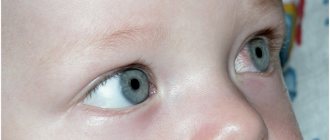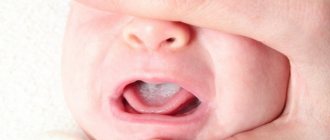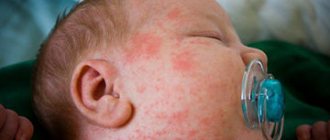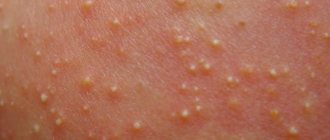Any parent is concerned about the health of their child at any age. However, when a child is still just a baby, much more attention is paid to his condition, because a small body is threatened by a huge number of diseases that he can get from the external environment. The most difficult thing in identifying illnesses in a child is the fact that at this age the child does not know how to speak, so he cannot accurately describe his symptoms and ailments. It is because of this that some ailments cannot be detected immediately. For example, cystitis.
This infection does not manifest itself externally, so you can understand that something is wrong with the baby only by his poor health, lack of mood and some other symptoms, which will be described below.
It is generally accepted that this serious disease is the lot of adults, especially women. However, the disease ranks second in “popular” diseases after respiratory inflammation. In addition, it affects not only female but also male infants. Any professional will confirm that infants are especially susceptible to inflammatory reactions, so the disease must be identified as early as possible. In addition, inflammation carries with it quite serious consequences if it is not treated on time.
Symptoms and treatment of cystitis in a newborn
Inflammation of the bladder is a common disease and occurs not only in adults, but even in infants.
The predisposition of girls to this pathology is several times greater than that of boys. The disease occurs with similar symptoms as in adults, only they are more difficult to identify and the treatment itself requires special care.
Various factors can provoke cystitis in an infant, since the immature immune system is not able to fight many pathogens. This is mainly infection of tissues due to such phenomena as:
- Insufficient child hygiene, especially in girls. Bacteria enter the genitals, for example, due to prolonged contact with a “full” diaper.
- Diarrhea. Gastrointestinal upset may be associated with a bacterial imbalance, which can cause infection of the genitourinary system.
- Colds, viral pathologies.
- The development of bacteria and fungi on the mucous membrane of internal organs. These are candidiasis, staphylococcus, ureaplasma, streptococcus and so on.
Cystitis mainly develops due to infection, which provokes inflammation, pain, and problems with urination.
Despite the similarity of symptoms, cystitis in young children is much more difficult to recognize, since the baby will not be able to indicate his anxiety. Only the attentiveness of parents will help determine inflammation of the bladder in the early stages, and then an accurate diagnosis can be established only after testing.
If you carefully observe the behavior of the baby, you can still notice the symptoms of cystitis. The following signs may indicate this:
- During urination, the child is capricious, but after finishing he calms down.
- Urine is released in small portions, often with an intermittent stream.
- Urinary retention with constant consumption of milk and formula.
- Change in the color of urine, in advanced stages the appearance of bloody spots.
- The appearance of an unpleasant odor, mucus, pus.
If you suspect cystitis or have symptoms, even minor ones, you should immediately collect urine for testing and contact your pediatrician.
It is impossible to assess the situation and condition of the baby visually and during examination. You definitely need to take tests and undergo hardware examination. The set of diagnostic measures includes the following procedures:
- Analysis of urine. It is important to correctly collect biological material so that the results are reliable. You definitely need to wash the baby and use special urine bags and a sterile container for collection. The biomaterial should be stored for no more than 2 hours in the refrigerator. The best option is to go to the clinic immediately after taking the test. A urine test is one of the most informative; based on the data, possible inflammatory processes and infectious pathogens are determined.
- Urine culture; in girls, vaginal smear.
- Blood analysis. Necessary to check the general condition of the body, to exclude complications from other organs.
- Ultrasound. Not only the bladder is visible, but also the rest of the pelvic organs.
- Cystoscopy. For small patients, this procedure is carried out only under anesthesia, since a special device is inserted through the urethra. Cystoscopy allows you to visually assess the condition of the bladder tissue, examine the structure and localization of inflammatory foci. Prescribed in complex or too advanced cases.
Timely and correct diagnosis helps to identify the disease in the early stages, select the right treatment, which can alleviate the baby’s condition in the shortest possible time and prevent complications.
Complex treatment
The goal of treating cystitis in children is not only to relieve symptoms, but also to eliminate the root cause of inflammation in the newborn. No matter how much parents would like to cope with folk remedies, such methods are not applicable for infants. It is necessary to select a medication course specifically for a small child.
Comprehensive treatment of cystitis for infants includes:
- Taking antibacterial drugs. There are special antibiotics adapted for young patients. They are prescribed exclusively by a doctor; the dosage, interval and duration of use must be strictly observed.
- Anti-inflammatory. Recommended for relieving inflammation, but it should be borne in mind that they relieve the inflammatory process, but do not eliminate the source.
- Antispasmodics. Relieving spasms will help the child empty the bladder with the least discomfort, reducing the pain of the process.
- Painkillers. If the baby is particularly anxious, it may be recommended to take painkillers, but they should be specifically for small children; drugs for adults are prohibited.
- Providing pastel mode and rest for the child.
- Increase fluid intake. If the baby is breastfed, then you should put it to the breast more often; if the baby is formula-fed, then perhaps the doctor will recommend supplementing with more water.
Treatment should be prescribed exclusively by a doctor; there is no need to experiment with traditional medicine, give fruit drinks or herbal infusions. This can aggravate the situation and cause allergic reactions.
During the treatment period, as well as to prevent new relapses, the baby’s intimate hygiene should be observed. It is correct to wash girls, taking into account the opposite direction from the vagina.
It is better to use diapers made of natural material and change them immediately as you empty your bladder or bowels. If modern brands of diapers are used, then they need to be changed at least 2 hours.
It is better to limit walking for a while, especially in the off-season or winter. There is no need to cancel water procedures; they can be supplemented with herbal infusions. An excellent option is chamomile, which has antiseptic and calming properties; sage is also suitable, but only in small quantities so that the specific smell does not irritate the child.
It is necessary to take measures to treat cystitis in infants immediately, as there is a risk of complications and the spread of inflammation to other organs. Pathology can spread to the kidneys, penetrate deeper into the bladder tissue and lead to ruptures and suppuration of lesions.
Due to the immature immune system, the baby can quickly become infected throughout the entire body. Allowing such situations to happen is very dangerous.
You can prevent cystitis in your baby with special preventive measures. These include the following recommendations:
- Exception: hypothermia of the baby, including prolonged exposure to wet underwear.
- If there are changes in the structure of urine or frequency of urination, you should consult a doctor and get tested.
- Monitor regular bowel movements and avoid prolonged constipation.
- Regular and proper baby hygiene.
- Timely diagnosis and treatment of acute respiratory viral infections and other diseases, including infectious pathologies.
Cystitis in infants can be effectively treated by selecting special therapy and, if necessary, improving the quality of care. To do this, it is enough to consult a doctor in time and do not interrupt the course of antibiotics, even if obvious improvements appear.
The issue of diseases of the urinary system is in second place after acute respiratory infection in children of the first year of life. Infants are especially vulnerable to infectious diseases of the kidneys and bladder. They often have a hidden pattern of the disease and rapid spread of bacteria throughout the urinary system.
The main task for young parents is timely detection of the disease and visiting a medical specialist to examine the child.
Inflammation of the bladder is a common disease and occurs not only in adults, but even in infants. The predisposition of girls to this pathology is several times greater than that of boys.
Additional recommendations
During the treatment period, as well as to prevent new relapses, the baby’s intimate hygiene should be observed. It is correct to wash girls, taking into account the opposite direction from the vagina.
It is better to use diapers made of natural material and change them immediately as you empty your bladder or bowels. If modern brands of diapers are used, then they need to be changed at least 2 hours.
It is better to limit walking for a while, especially in the off-season or winter. There is no need to cancel water procedures; they can be supplemented with herbal infusions. An excellent option is chamomile, which has antiseptic and calming properties; sage is also suitable, but only in small quantities so that the specific smell does not irritate the child.
Treatment of cystitis in young children
As you know, cystitis is a disease that is an inflammatory process in the bladder. This disease is very unpleasant and painful. But it’s even worse if cystitis occurs in a baby. What are the signs and symptoms, and what should be the treatment?
The child is sick because an infection enters his bladder through the genitourinary canal. The main causative agents of the disease are Escherichia coli and staphylococcus. In infants, it occurs in equal proportions in both boys and girls. And the disease manifests itself in acute and chronic forms.
The most common cause of cystitis in infants is an infection that gets into the kidneys and urinary canal. The main pathogens are staphylococcus, chlamydia and E. coli. In most cases, they enter the body of babies due to the fact that parents do not pay the necessary attention to caring for the child.
To protect an infant from cystitis, you need to take care of the cleanliness of his genitals.
Under no circumstances should a baby be allowed to lie on dirty diapers or in a wet diaper for a long time.
Under no circumstances should a child be allowed to swim in public bodies of water without underwear. Since such bodies of water are a breeding ground for infection, which can easily penetrate the bladder. In addition, cystitis can occur due to problems in the intestines. It is necessary to take care of the proper nutrition of the newborn to prevent constipation or infrequent bowel movements.
The baby should under no circumstances be overcooled, as this will cause his immunity to weaken and be unable to fight infectious diseases on his own. As a result, an inflammatory process in the bladder may occur.
The child should go to the toilet at will, and not hold urine. Because urine itself has antibacterial properties, but with prolonged abstinence it loses them and can become a good environment for the development of bacteria.
A child can become infected with cystitis directly in the maternity hospital. The appearance of thrush or a fungal infection can occur in a baby due to infection during birth. The bacteria were in the mother's birth canal. For this reason, bacteria are found on all mucous membranes of the baby.
But it should also be noted that the very presence of bacteria in the body of a newborn does not lead to illness, since the child’s urine has antiseptic properties and with frequent urination, the infection is removed from the body.
Cystitis in infants can be provoked by:
- The specific structure of the genitourinary system, which provokes urinary retention.
- Frequent colds that arise from the baby's hypothermia. Such factors weaken the immune system, due to which the infection enters the body unhindered.
- Long-term use of medications that affect the immune system.
- If the child has worms. They penetrate the urinary canal and provoke the occurrence of an inflammatory process.
- Any allergy not only provokes a rash on the baby’s skin, but also causes inflammation of the mucous membranes. Including the bladder.
- If parents, for fear of hypothermia, wrap the child up too much and do not give the body the opportunity to learn on its own to fight infections.
It is important to know! If a child gets sick very often and takes medications, then you need to pay attention to his urinary system and ask the doctor to examine the baby for cystitis.
At the very beginning of the disease with cystitis, the child is not very restless. More severe manifestations occur as the disease progresses, but in general the baby’s condition remains stable.
Diagnosing cystitis in infants is very difficult, because at this age children cannot yet talk about their feelings. Due to this, the disease cannot be detected in most cases.
But it should be taken into account that the painful symptoms of cystitis in infants are much weaker than in adults. The only thing that indicates illness is the child's frequent requests to go to the toilet, which in most cases may be false. The child cries and behaves restlessly.
Memo to parents! To keep your baby healthy, you need to see a doctor at the first sign of illness in your child and start treatment. Otherwise, the disease becomes chronic, and the bacteria spread throughout the child’s body.
In severe cases of the disease, the infant increasingly asks to go to the toilet and experiences severe pain. Over time, purulent discharge appears from the urethra.
During urination, the child cries in pain and constantly holds his tummy.
In order to find out the reason for this behavior, you need to collect a small amount of urine in a transparent container and look at its color. If it has cloudiness, an admixture of blood and an unpleasant odor, then this is a sure sign of the disease. You should immediately contact a specialist. In a child of the neonatal period, cystitis can be diagnosed using a urine test.
Important to remember! If, at a high body temperature in a child, drugs with antipyretic properties do not bring any effect, this means that the child develops cystitis.
Diagnostics
The baby should be examined by either a pediatrician or a urologist. But since it will not be possible to interview the baby, laboratory tests are also used on him. If cystitis is suspected, the following tests are prescribed:
- General blood and urine tests for the presence of leukocytes, red blood cells and protein.
- Tests for tank culture.
- An ultradiagnostic examination of the kidneys and bladder is performed.
At the same time, additional studies are prescribed. Such as:
- urological fluoroscopy;
- cystoscopy;
- Addis-Kakovsky test.
: cystitis in children.
- Lack of good mood. Crying, whimpering. Behavior during urination especially changes. The child becomes restless, as if the process gives him discomfort or unpleasant sensations.
- Urine changes color. It's getting darker. The smell also changes, it becomes pungent.
- Since this is an infection, there is an increase in temperature (usually up to 39 degrees).
- Urine retention is possible.
- Uncomfortable feelings in the lower abdomen, pain.
- There may be blood in the urine.
- Urinary incontinence is possible, as infection provokes nerve cells.
- Loss of appetite, refusal to eat.
- Urine changes consistency, mucus impurities are observed (usually in “flakes”).
- Very frequent need to urinate, but insufficient output of urine.
It is worth remembering that children of this age should not self-medicate. Improper treatment of this disease can lead to consequences that will be much more difficult to correct. Only a specialist can prescribe correct and effective treatment that will not harm the baby. Dr. Komarovsky advises that at the first symptoms of cystitis in an infant, consult a doctor to receive effective treatment.
Typically, when treating children of this age, herbal medicine methods are used:
- drinking warm water or chamomile decoction;
- herbal baths;
- if the child is breastfed, then a diet for the mother is necessary (it is forbidden to eat fried and fatty foods, spices, coffee and alcohol).
If tests show that the disease is advanced, and clots of pus are observed in the urine, then medications will be added to herbal medicine. It is worth remembering that when treating cystitis in an infant, no medications should be given without a doctor’s prescription; instead of benefit, they can only cause harm. Based on the test results, the doctor will prescribe medications that are suitable for the child’s age, determine the correct dosage and period of use.
According to Komarovsky, cystitis in infants in advanced form must be treated with antibiotics. To antibacterial therapy, it is necessary to add drugs to restore intestinal flora, antimicrobial agents (here it is better to use herbal decoctions) and, of course, more liquid (dill water, chamomile decoction, boiled water).
The treatment of inflammation of the bladder mucosa must be approached with all responsibility. The immunity of babies at this age has not yet been formed, so untimely treatment for symptoms of cystitis in an infant can lead to complications, such as inflammation of muscle tissue and kidneys.
During the treatment period, the child should not be overcooled; after each urination, it is necessary to wash the baby and monitor his hygiene. If breastfeeding is present, then the mother must adhere to the diet prescribed by the doctor. You need to include broccoli and fresh cucumbers in your diet; you should not eat foods that can cause allergic reactions and constipation in your child.
Prevention
To prevent the occurrence of the disease, children should be taught proper hygiene from the first years of life, and infants should be washed after each bowel movement. The child should lead an active lifestyle, eat right, and avoid stress. In kindergartens and at home, you should only use your own towel.
Parents should monitor how their baby is dressed and wearing shoes so that he does not get his feet wet and does not become hypothermic in frosty or windy weather. At the first signs of infection, it is necessary to consult a doctor and promptly treat detected diseases so that they do not lead to cystitis.
Causes of the disease
- Cystitis occurs due to infection entering the bladder or kidneys. This could be chlamydia or E. coli bacteria.
- Lack of proper care. Remember that children need timely diaper changes, their own towel, and careful adherence to intimate hygiene.
- Incorrect/disturbed metabolism. This may be caused by taking medications for a long time or due to allergies.
- Reduced immunity. Promotes rapid penetration and development of infection.
- Inflammation can develop in families. Yes, this infectious disease can indeed be inherited. If you know that your family/ancestors had similar infections, keep in mind that your child is at risk and his body is much more susceptible to disease than the body of a child without such heredity.
- Hypothermia. Therefore, if you come after a walk with your baby and notice that he is quite cool, you should know that it is quite easy for bacteria of this serious illness to develop at this moment.
In the absence of congenital defects that can provoke an infectious-inflammatory process in the bladder, simple recommendations for child care will help prevent the development of cystitis. To do this you need:
- Continue breastfeeding your baby for as long as possible. After all, mother's milk provides immune protection to the child and protects him from the influence of various infections;
- gradual introduction of complementary foods with constant monitoring of intestinal functions;
- monitor your baby’s drinking regime using plain water;
- carry out daily toileting for the baby using only baby hygiene products;
- before changing the diaper, treat the child’s perineum with wet wipes and allow the skin to “breathe” (air baths);
- change the child’s underwear daily and prevent hypothermia.
Cystitis in an infant is a serious problem. Even without clearly defined signs of illness, unexpected complications develop very quickly. They can only be prevented by an emergency visit to a doctor.
Cystitis is an inflammation of the mucous and perimucosal lining of the bladder, sometimes spreading to the urinary tract. Most often, intestinal bacteria are to blame for the onset of the inflammatory process. According to medical statistics, cystitis is 5-6 times more common in girls than in boys. This is due to the physiological characteristics of the structure of the urinary canal: in girls it is shorter, so bacteria have time to travel to the bladder much more efficiently and with less loss.
Cystitis in children can be acute or chronic.
It becomes chronic if the child is not given the correct treatment in the acute stage. It is difficult to miss and not notice cystitis - the child will definitely report his unpleasant sensations.
Only infants have difficulties with diagnosis. They suffer from cystitis no less than older children, but they can’t say anything, and the mother’s constant crying will be attributed to anything: teeth that are cutting, infant colic, hunger, cold or heat, the baby’s bad mood and his capricious character. . Meanwhile, the true reason for this behavior will remain unknown, and acute cystitis will quickly develop into chronic.
Why does inflammation occur?
Abnormal structure, dysfunction and the entry of microbes into the bladder are the key causes of cystitis in children. If there are no malfunctions in the urinary system, the bladder itself is cleared of pathogenic microflora during urination. Its mucous membrane is highly resistant to infections. But if it is damaged, local immunity decreases, pathogenic microbes penetrate inside the wall.
Cystitis in 90% of cases is caused by bacteria:
- klebsiella;
- coli;
- staphylococcus;
- a combination of several microbes.
Many parents are interested in whether their child can develop viral cystitis. Yes maybe. Pathogens of adenoviral, herpetic and influenza infections provoke a violation of the outflow of urine from the bladder. This creates favorable conditions for the growth of bacteria.
An unbalanced diet is one of the key reasons for changes in urine pH and the formation of sand in the kidneys. When it gets into the bladder, it injures the mucous membrane, which increases the risk of infectious inflammation by 4 times.
In 9 out of 10 cases, cystitis in a small child occurs due to a decrease in immune status and impaired urine flow. Urologists identify several provoking factors:
- vesicoureteral reflux (backflow of urine from the bladder);
- hypothermia of the body;
- functional urinary disorders;
- lack of personal hygiene;
- vitamin and mineral deficiency;
- sedentary lifestyle;
- urinary tract infections;
- phimosis (narrowing of the foreskin) in boys;
- kidney stone disease;
- bacterial tonsillitis;
- diabetes;
- vulvovaginitis in girls;
- unbalanced diet;
- chronic pneumonia;
- helminthic infestations;
- insertion of a catheter or cystoscope into the bladder;
- treatment with antibiotics, cytostatics.
Cystitis in a one-year-old child with weak immunity and hypovitaminosis is often caused by fungi, usually from the genus Candida. Trichomonas inflammation of the ureter occurs mainly in teenage girls who are sexually active.
What to do at the first symptoms
If one or more of the signs described above is observed in your baby, you should immediately seek the help of a specialist. Cystitis is an infectious disease that, without proper and timely treatment, develops into a chronic disease. It is very difficult to cure, and in some cases impossible. In addition, the development of even more serious illnesses is possible.
To begin with, you must undergo an initial examination, which involves interviewing the parents (taking an anamnesis to find out whether there is a risk of hereditary transmission), identifying signs, examining the patient and ordering tests.
Inflammation is diagnosed using:
- Blood/urine analysis. Here the level of leukocytes is measured (during inflammation they are increased) and other factors that help to understand whether there is an infection inside and, if so, what kind of infection;
- Ultrasound. To see inflamed areas (bladder, kidneys). In addition, it helps to determine whether changes have occurred and whether foreign bodies are present;
- Cytoscopy. It is carried out only in cases of chronic illness, and only when the inflammatory stage subsides.
The first signs of cystitis
The first signs of cystitis directly depend on the form in which it occurs. If a child has an acute pathology, it is characterized by rapid development of the problem. The main symptom is urinary syndrome. The child feels the urge to empty the bladder every 10-20 minutes. This is due to increased reflex excitability of the bladder and irritation of nerve endings. Additionally, the child may begin to complain of pain in the area above the pubis. Unpleasant sensations may radiate to the perineum. The pain intensifies with palpation of the abdomen and in case of slight filling of the bladder.
General signs of intoxication of the body are also observed. The child feels weak. He may feel dizzy. Nausea and vomiting are often present. The temperature rises to 37-37.5 degrees Celsius. Sometimes the value of the indicator can reach 39 degrees. It all depends on the child’s immunity and the presence of concomitant diseases. If small children are sick, there is increased irritability. The patient cries constantly. Older children become nervous.
Types of disease
Depending on the severity of the clinical manifestations of the disease, the present signs and the results of laboratory and instrumental research methods, acute and chronic cystitis are distinguished.
Spicy
It is characterized by an abrupt onset and rapid increase in clinical symptoms. The main symptom of acute cystitis is difficulty urinating. In some cases, the disease leads to disruption of the general condition of the newborn.
Chronic
Chronic cystitis in children occurs in the form of a recurrent or latent disease. The first option is characterized by periodic exacerbations, which leads to a sharp deterioration in the child’s well-being.
With a latent course, there are no pronounced symptoms, as a result of which parents do not even suspect the presence of diseases of the urinary system. Signs include frequent urination, which is accompanied by minor discomfort.
Usually, diagnosing cystitis is not a problem, since all the symptoms speak for themselves, but in infants it is more difficult to determine this disease, since babies at that age cannot say what exactly is bothering them. Cystitis is an inflammation of the mucous membrane of the bladder. The disease causes pain and discomfort when urinating. If it is not diagnosed in time, the disease can become chronic and will be provoked by any disease.
Why is bladder inflammation dangerous?
Childhood cystitis often develops into a sluggish form, which is difficult to treat. Chronic inflammation provokes structural changes in the bladder, as a result of which its functions are impaired. Possible complications of the disease include:
- sclerosis of the cervix;
- vesicoureteral reflux;
- bladder diverticula;
- peritonitis;
- pyelonephritis;
- paracystitis;
- prostatitis (in teenage boys).
In a child under 8 years of age, the disease is complicated by spasms of the external urethral sphincter. As a result, a reflex delay in the outflow of urine occurs. This condition is dangerous due to stone formation in the bladder, expansion of the calyces and pelvis of the kidneys.
Which doctor should I contact?
The best gynecologists are ready to help you! Select your city - then choose a specialty and find the best specialist in your city!
Do not forget that it is advisable to contact a specialist, otherwise you will not receive competently formulated therapy anywhere.
The urologist can refer you for an ultrasound and tests, and after receiving them, take treatment measures. If the malaise is not at a severe, advanced stage, pills are prescribed and you can treat it at home. If the inflammation has reached a serious stage, the disease spreads further, individual therapy is selected, and hospitalization is possible.
Remember that the most important thing is to contact a professional in a timely manner to identify the source of infection and eliminate it. In addition, only a competent selection of medications can eliminate the disease completely.
It is not recommended to deal with the infection on your own. However, there are auxiliary methods that can be used in conjunction with taking medications prescribed by the doctor. For example, drink solutions that have diuretic properties:
- cranberry or blueberry fruit drinks;
- kidney tea;
- herbal preparations.
In addition, special diets can be considered an excellent way to self-medicate. It is based on the principles of excluding alcohol, spicy, salty, and smoked foods. This way you can speed up your own healing and improve your well-being.
Diagnosis of pathology
Most often, concerned parents turn to a pediatrician, but a full range of diagnostic measures and treatment prescriptions are carried out by a pediatric urologist.
To make a correct diagnosis, you need to undergo the following tests:
- General urine analysis. Usually, the urine of a sick child contains leukocytes, hematuria of varying degrees - individual red blood cells or blood clots, a lot of mucus and transitional epithelial cells.
- Urine culture for microflora. Material for research should be collected after a thorough toilet of the genitals. The analysis determines the type of bacteria that caused the inflammation.
- Two-glass sample. In this case, urine is collected in two doses - 30–50 ml in one container and the rest of the portion in another container. Then a microscopic examination of the material is carried out: if leukocytes are detected only in the first portion, this indicates inflammation in the urethra, if in both, then this indicates cystitis.
- Clinical and biochemical blood tests. In the general analysis, an increased number of leukocytes, acceleration of ESR (signs of inflammation) are determined; biochemical analysis serves to assess the functional abilities of the urinary system.
Instrumental studies for bladder inflammation:
- Two-stage echography (ultrasound) of the bladder - before and after urination. In this case, thickening of the mucous membrane of the organ and many echo-negative elements in its lumen are detected.
- Cystoscopy and cystography. They are carried out in children with chronic cystitis during remission. These methods are aimed at assessing the nature and extent of pathological changes in the inner lining of the bladder. Cystoscopy is the most reliable method for diagnosing the disease. In young children and boys, the examination is carried out under general anesthesia. Before the procedure, electrocardiography and examination of the child by an anesthesiologist are required.
Differential diagnosis is carried out with the following pathologies:
- acute pyelonephritis,
- bladder neoplasms,
- gynecological pathologies in girls,
- acute urethritis,
- paraproctitis (inflammation of the rectal tissue),
- acute appendicitis.
To exclude these pathologies, the child may be referred for consultation to specialists: a pediatric surgeon and a gynecologist.
Causes of the disease
First of all, you should pay attention to the child’s hygiene and immunity. Changing diapers in a timely manner and monitoring the overall well-being of the baby is as important as adequate nutrition for the baby, which is often solved simply - with breast milk. If you have problems with this, you should think about it and choose the optimal artificial nutrition. The same applies to complementary feeding in the future. A properly functioning intestine affects many organs and the condition of the child as a whole. In addition to good stool, the baby must also have a strong immune system. Also follows:
- Avoid hypothermia.
- Do not develop diseases that can lead to cystitis.
- Observe the rules of infant intimate hygiene.
- Monitor the general condition of the baby.
To prevent the disease from becoming chronic, you should immediately contact a specialist at the initial signs.
- If a child is predisposed to inflammation, it is necessary to adhere to a diet.
- Maintain good intimate hygiene (frequent changes of underwear, diapers, thorough cleansing of the genitals, etc.)
- Avoid hypothermia. Remember that, first of all, it is low body temperature that provokes infection.
- It is necessary to control the water balance.
- Always contact a specialist in a timely manner, never delay treatment. If there are signs, do not ignore them under any circumstances.
- Supporting immunity.
Remember that if you maintain proper hygiene, no problems should arise, so this is the most important rule of all preventive measures.
(Visited 234 times, 1 visits today)
Related posts:
- Smell of urine with cystitis
- The first signs of cystitis in women
- Symptoms of cystitis in girls
- Symptoms and treatment of cystitis in boys
- Symptoms of male cystitis
Do not sit in the cold, do not become overcooled (this has nothing to do with walking barefoot).
Teach a child how to wash himself correctly, and children how to wash themselves correctly. This is especially important for little girls - they must be washed under running water from the genitals to the anus, and not vice versa. Boys should not be washed with soap, opening the foreskin spontaneously - a chemical burn can cause not only cystitis, but also diseases that are much more serious.
It is necessary to increase children's immunity. This should be done not with different tablets and syrups produced by pharmacists, but with hardening, proper nutrition, rich in vitamins, and regular walks.
You will learn more about the treatment of cystitis in children from the following video.
Preventive measures
You can prevent cystitis in your baby with special preventive measures. These include the following recommendations:
- Exception: hypothermia of the baby, including prolonged exposure to wet underwear.
- If there are changes in the structure of urine or frequency of urination, you should consult a doctor and get tested.
- Monitor regular bowel movements and avoid prolonged constipation.
- Regular and proper baby hygiene.
- Timely diagnosis and treatment of acute respiratory viral infections and other diseases, including infectious pathologies.
Cystitis in infants can be effectively treated by selecting special therapy and, if necessary, improving the quality of care. To do this, it is enough to consult a doctor in time and do not interrupt the course of antibiotics, even if obvious improvements appear.
Reasons for development
There are actually many reasons for the development of cystitis in infancy. The genesis of formation depends on certain factors due to:
- Unfavorable intrauterine development of the fetus in mothers with urogenital pathologies, which can become a predisposing factor for the development of infection in the child’s urinary system.
- Direct infection in the mother's womb, or introduction of the pathogen during childbirth.
- The presence of sexually transmitted infections in the mother of the newborn (occurs in more than 15% of newborns).
- Disturbances in the baby’s immune system, provoked by the predominance of T-helpers in the body - protective leukocytes that enhance the adaptive immune response (attack of the body’s own cells).
- Intrauterine oxygen starvation of the fetus (hypoxia), causing acute disorders of biochemical and physiological processes in newborns. As a result, up to 40% of infants are born with morphological and structural changes in the tissues of the bladder and its functional disorders.
Lack of hygiene when caring for a baby, urodynamic pathologies (reflux, urological obstruction, developmental abnormalities, genetic predisposition) can provoke an infectious process. The factor of intrauterine infection (influenza, Coxsackie, parargippus, cytomegalovirus, agenovirus, herpes) cannot be excluded. In children, the development of cystitis is dominated by gram () and gram (-) flora, anaerobes and intestinal strains of collie bacteria.
According to foreign studies, babies who are switched too early (after six months) to artificial complementary feeding are at greatest risk of developing infectious and inflammatory lesions of the urinary bladder tissues. Which may be due to the introduction of infection with food.
General information about the disease
Cystitis is an inflammatory process that affects the walls of the bladder. The disease can develop in a child at any age. In infants, the disease is diagnosed in equal numbers in both boys and girls.
For older children, the statistics are somewhat different - girls get sick five times more often than boys. There are a number of reasons for this:
- In girls, the anatomical structure of the genital organs is significantly different from that of boys. Their urethra is shorter and wider. In addition, the anus and vagina are located close to it. They contain various microorganisms that can cause infection of the urinary system.
- During adolescence, girls undergo changes in the hormonal and immune systems, significantly reducing the protection of the mucous membranes of the genitourinary tract. For this reason, in adolescence, girls are often diagnosed with vulvovaginitis and colpitis.
We should not forget that teenage girls prefer to wear low-rise jeans and thongs, which in the cold season lead to hypothermia and serious problems not only with the bladder, but also with the kidneys.
How to recognize cystitis in infants in time
The clinical picture of bladder damage in infants is blurred and hardly noticeable, so it is difficult to immediately recognize cystitis. Often, the only symptom of the disease is high fever. Characteristic signs, in addition to temperature, appear:
- processes of frequent, difficult and painful urination, which is accompanied by tearfulness, capriciousness and irritability of the child;
- changes in the color and smell of urine (unpleasant odor and dark color of urine);
- bloating and restless sleep;
- general weakness and possible hyperemia of the genitals;
- weakness of sucking function, or apathy towards food.
Diet
Nutrition during an exacerbation should be balanced and easily digestible. It is recommended to eat soups, cereals, and dairy products.
It is necessary to exclude salty, fried and spicy foods, and carbonated drinks from the diet.
Since their action negatively affects the condition of the bladder mucosa. If you have cystitis, it is important to drink a lot.
The liquid helps remove bacteria from the body and reduce pain. You can drink still water, warm tea, fruit drinks. The recommended volume of liquid should not be less than 1.5 liters.
It is recommended that infants be put to the breast as often as possible.
Therapy for the treatment of cystitis in young children
Therapeutic tactics for cystitis in infants include several areas that ensure effective therapy in the shortest possible time and prevent the possible development of extensive infection of the genitourinary system. Treatment includes:
- The earliest possible prescription of antibiotic therapy, selected taking into account the sensitivity of pathogens.
- Timely correction of identified urodynamic disorders.
- Long-term antibacterial prevention of disease relapses.
- Control of gastrointestinal tract functions.
Fever accompanied by signs of toxicosis in an infant is a sure indicator of immediate administration of intravenous antibiotics. They return to oral treatment when the baby’s condition stabilizes within 24 hours. Self-treatment of a child is unacceptable, since not all drugs are approved for the treatment of infants. Such children require constant medical supervision and must be treated in a hospital.
Treatment prognosis
With proper treatment, acute cystitis is completely cured in 98% of children. Inflammation becomes chronic when:
- immunodeficiency states;
- untimely treatment of infection;
- abnormal structure of the genitourinary system.
Sluggish inflammation in the bladder is difficult to treat. In the best case, they achieve stable remission. But with hypothermia, urinary infections, and bladder injuries, exacerbations occur.
For indolent cystitis in a small child, it is necessary to identify and eliminate the cause that maintains the inflammation. Only in this case there is a chance for recovery.











